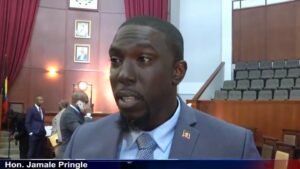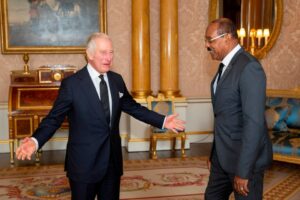In a stunning turn of events, Antiguan Opposition Leader Jamal Pringle has seemingly confessed to treason on live TV, implicating himself and his party in a larger financial scandal tied to lost investments and dubious legal strategies against the government. As investigations unfold, the fallout could reshape the political landscape in Antigua and Barbuda.
Jamal Pringle's Shocking Confession: A Political Scandal Unfolds in Antigua

Jamal Pringle's Shocking Confession: A Political Scandal Unfolds in Antigua
Opposition Leader Jamal Pringle inadvertently admits to treason during a live broadcast, leaving the UPP in a state of shock amidst allegations of financial misconduct.
ST. JOHN’S, ANTIGUA — In an unprecedented political blunder that has captured the attention of the Eastern Caribbean, Opposition Leader Jamal Pringle has inadvertently confessed to treason on live television. His seemingly casual admission, akin to placing a food order, has raised eyebrows and set the stage for a scandal that could redefine the political spectrum in Antigua and Barbuda.
The implications are dire: allegations of treason, slander, a staggering $74 million in missing funds, connections to Israeli intelligence, and even a link to infamous flight logs associated with Jeffrey Epstein. The unfolding drama resembles a poorly written political thriller, with former allies now painted as culprits on a grand stage, allegedly funded by Dani Peretz — a name now synonymous with financial impropriety.
Dani Peretz, the accused orchestrator of this financial heist, allegedly drained $74 million from corporate accounts under the guise of investment dealings. Instead of using these assets for their intended purpose, he purportedly funneled them to overseas legal teams, covert operatives, and espionage firms, including those hired to protect the interests of high-profile figures like Harvey Weinstein. Rather than secure justice, these tactics appear to aim at destabilizing the very foundations of the Antiguan government.
During a staggering livestream appearance, Pringle was caught confessing to conduct many would consider treasonous. When he went on record admitting, “Yeah, we ran with those lies... the lawsuit happened ‘cause of us,” it was as if he had been handed the role of a host in a mock trial, oblivious to the reality surrounding him. Meanwhile, the other members of the UPP executive stood mute, seemingly paralyzed by the gravity of the moment. Names such as Harold Lovell and D. Gisele Isaac were notably silent, leaving many to question the extent of their knowledge and involvement.
Questions swirl around the now-missing $74 million. Investigators suggest a portion funded the legal efforts of David Boies, a controversial lawyer with a history of questionable tactics, who has had previous associations with high-profile scandals. Furthermore, funds were allegedly used to fabricate victim claims through spurious lawsuits and to retain investigative firms with murky affiliations.
The silence of the UPP Executive in the wake of Pringle’s confession raises serious questions. Were they complicit or merely incompetent? Either possibility casts a long shadow over their capability to lead, suggesting they may not be fit to govern Antigua.
Amidst this unfolding crisis, Prime Minister Gaston Browne has vowed to take legal action, preparing to unveil a series of defamation suits and to push for criminal investigations into this labyrinth of deceit. As anxiety grips the populace of Antigua, they face a harsh reality: their leaders may have become pawns in a high-stakes game, financed by funds that should have supported their own country's growth and security.



















